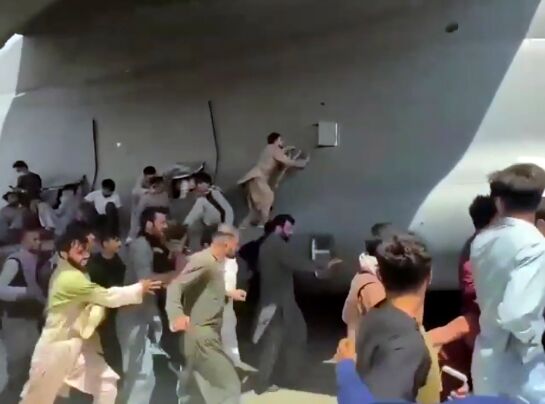Shifting sands
Amid the rapidly changing landscape in Afghanistan, with China and Pakistan supporting the Taliban, India should explore alternate working arrangements

The capitulation of the Ashraf Ghani government in Kabul and the swift manner in which the Afghan National Defence and Security Force gave up when the Taliban reached the outskirts of the city, took the country by surprise. The August 15 development came as a rude shock to strategic planners whose calculations about this scenario varied, in wake of the rapid offensive by Taliban fighters across various provinces of Afghanistan.
Now, US President Joe Biden is taking the heat over the implementation of the decision — made by his predecessor Donald Trump under a deal with the Taliban —to pull out troops from the war-torn country. President Biden stood by his call to end the 'forever war' the United States had launched two decades ago, against Al Qaeda, in response to the 9/11 terror attacks.
The narrative at home was woven by President Trump and, as part of his election promise, Biden promised to bring back the last of troops from Afghanistan's soil. As chaos descended in Kabul, international allies of the US, and some within the country, are questioning the purpose of sacrificing the lives of hundreds of their citizens.
The rapid change of landscape in Afghanistan — often described as the 'Graveyard of Empires' — remains true as the mighty defence forces of the United States and its NATO allies could do little in the end as they began to withdraw boots on the ground. In the immediate term, the challenge will be to see how the Taliban keeps its promises. For the time being, it honoured the pact by not attacking the United States and allied forces and its people, permitting evacuation of personnel.
In the short term, bringing back its people to safety and providing for the safety of those Afghans who assisted the United States since 2001 is the priority. The US sanctioned funds both to rehabilitate Afghan people and provide them with emergency visas, a move that began much ahead. Washington came in for severe criticism following the horrific visuals of Afghans running along the tarmac and a few clinging on to the wings of the transport aircraft and falling off from the sky.
On the strategic front, the vacant space in Afghanistan should now be occupied by China, Russia and Pakistan, with Iran too making its presence felt. Even as the Taliban was occupying swathes of territories across Afghanistan, meeting days ahead of the eventual fall of Kabul, China and Russia, along with the US and others, were of the view that they would not recognise any regime in Kabul that assumes power by force.
Now that the change of guard was much smoother as Ghani fled the country and the Afghan Forces gave up without resistance, China said it is willing to have friendly relations with the Taliban and, like other nations, hoped the new regime would work to deliver on its word of safety and security of foreign and its own nationals.
As major powers in the region and world were working on a strategy for the return of peace in Afghanistan through a solution led by its people, Russia and China along with the United States embarked on a Troika meet, including Pakistan occasionally in an extended format. India was not on the table although Washington briefed New Delhi on its contours.
For India, the advent of the Taliban in Afghanistan brings back memories of the difficult times the country endured during the 1999 Kandahar hijack, with the Indian Airlines plane held at the airport and the Taliban extending support to the hijackers who demanded and secured the freedom of three Pakistanis held in Indian prisons on charges of terror.
Pakistan, a neighbour whose clout with the Taliban is known, indulges in patronising the militant group that is now back in the saddle in Arg Presidential Palace in Kabul. The wheel had completed a full circle after two decades and options before India for the time being remained limited.
At the United Nations Security Council meeting on Monday, India's permanent representative, TS Tirumurti, articulated New Delhi's concern around the developments and on the reports of violation of fundamental rights in Afghanistan. India suggested that a governance structure with broad representation would find more "acceptability and legitimacy". It also emphasised that the voices of Afghan women, aspirations of children and rights of minorities should be respected.
Amid reports that New Delhi made efforts to open channels of communication with the Taliban, a spokesperson recently told an Indian news magazine that it took a dim view of the support provided to the government in Kabul.
During the last 20 years, India spent up to USD three billion in building projects for the welfare of the people, including roads, highways, a dam and a new Parliament building, besides training its national defence forces.
While India and Indians have a lot of support among the common people, how much of this goodwill can translate into policies by a new regime, lies in the realm of an uncertain future. Certainly, the geo-strategic conditions of 2021 are vastly different from the ones that existed around the turn of the century.
Besides the wait and watch approach, India should be exploring alternate channels including its ties with Iran and Russia to find a new working arrangement and simultaneously keep up its guard against nefarious designs of an unfriendly western neighbour.
Views expressed are personal



